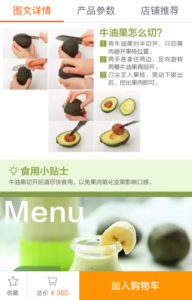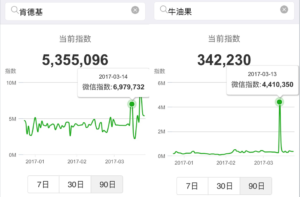The new KFC’s campaign falls flat but might disrupt the avocado industry in China
Chinese netizens began to regard the avocado as “the middle-class fruit” (“中产阶级的水果”) for its expensive price tag and acquired taste. “For now, avocados are quite popular in first-tier cities mostly. But the market is developing thanks to the westernization of the food service sector in major and lower-tier cities, where consumers are more and more exposed to avocados every day,” explains Clément Mougenot, Research Director at Daxue Consulting. The “butter fruit” (牛油果), as it is called in Chinese, is winning over a growing portion of consumers and restaurants, with the sales volume on Tmall (天猫) and Taobao (淘宝) rising from 1.37 million in 2015 to 2.41 million in 2016–76% growth over a year—with 76% of revenue attributable to Tmall in 2016. Research by Daxue Consulting found that the support from e-commerce retailers such as Yihaodian (1号店) or Tmall Supermarket (天猫超市) has helped with the growing popularity of avocados. Online retailers often provide detailed product descriptions, including country or origin, promotions, health benefits, and more.

Product description from online retailer Tmall Supermarket including instructions for cutting an avocado.
As the worldwide avocado craze reaches a fever pitch, fast food brands have not waited on the sideline. Kentucky Fried Chicken (肯德基) launched the “Avocado Twister” wrap in South Africa in 2009. Burger King (汉堡王) started to sell avocado products in the U.S. four years later, after which McDonald’s (麦当劳) pushed out competing fare in Japan (2014) and Australia (2015). In China, though, the trend has yet to catch up. But the country’s leading restaurant company, Yum China (百胜中国), which operates Pizza Hut (必胜客) and KFC locally, is betting big on the avocado burger. Ironically, since Yum China spun off from Yum Brands in October 2016, the food giant has come increasingly closer to international standards to offset growing domestic competition. In 2016, PizzaHut unveiled the “Seafood Avocado Pizza” 牛油果大虾披萨). In December last year, Yum China brought Taco Bell, the world’s largest Mexican-inspired restaurant chain, to China. Taco Bell’s menu features international favorites adapted to local tastes, such as the Shrimp and Avocado Burrito, unique to Taco Bell restaurants in China. Bell’s first restaurant in China is part of the brand’s global growth strategy of reaching 1,000 restaurants globally by 2022.
It is no coincidence that Taco Bell chose China as the first major proving ground for its expansion project. Young Chinese consumers still make up for the largest fast-food consumer group, but now they prefer a wider variety of tastes than offered by traditional fast food venues. Young Chinese consumers tend to choose more experiential and healthy dining experiences, and Western fast-food chains that used to be seen as a novelty are rapidly losing their appeal in China. “Instead of Taco Bell’s American approach—quick, cheap, often unabashedly junky—the Shanghai restaurant seems intent on easing Chinese diners into ordering. The menu in China features enlarged images of foods on a lighted board and a transparent kitchen, where skeptical customers can watch their food being assembled.” reports the New York Times. According to Liu Xiaoyi, chief editor of a local food guide, Chinese people are “willing to try new things.”
To counter balance image issues from previous food scandals, fierce competition in a saturated fast food market, and to meet Chinese consumers growing demand for healthy food, KFC China launched two products containing avocado on March 14 this year to position itself in the “green” movement. But what do Chinese really think about KFC’s new avocado burger?
KFC’s first attempt to “go green” using a funny KOL
KFC’s latest advertising campaign for its new avocado burger, features a famous Chinese singer holding a KFC burger, with a green avocado sauce mustache on his upper lip. The campaign ‘一绿爆红’ (which could be translated as “Go green to be red”) launched on March 13 to advertise KFC’s two new products, the “Avocado Zinger Burger” (“牛油果香辣鸡腿堡”) and the “Avocado Twister” (“牛油果香辣鸡肉卷”), in two different video commercials released on TV, online, and through social media. The avocado burger is a brand new item featured in KFC China’s menus. In line with the brand’s humoristic and slightly off-the-wall international ad campaigns, KFC unveiled its new face, the Chinese singer Joker Xue (薛之谦), who has 29 million fans on Weibo. The singer instantly became a hit in 2015 thanks to the funny jokes and stories he was posting on Weibo.

Joker Xue has always teased himself, saying that he was dying to be red (“红” stands for “red” in Chinese, which also refers to “being trendy” while used as an adjective). Amusing words and exaggerated behavior have become his signature among younger audiences.
In the main TV commercial, Joker plays different roles, successively a famous star, a Charlie Chaplin clone, a rock star, and a Beijing Opera actor, sporting the green mustache throughout.

At the beginning of the advertisement, many journalists are taking photos of Joker on the street, along with twinkling camera flashes, to show that he is very “hot.” The word says: ‘一绿爆红’(”Go green to be red”)
To reconnect with millennials who are increasingly turning their backs on fast food, KFC China’s advertisements are now more closely following the young’s enthusiasm for comedies and handsome idols. After inviting the superstar LuHan (鹿晗, 29 million followers on Weibo), an idol whose fans are mostly young girls, KFC started to use humor to communicate the brand with the comedian Qiao Shan (乔杉, 932 thousand followers on Weibo). KFC’s strategy seems to be paying off, as the burger chain is still considered the favorite Western fast food chain among young Chinese. But how long can KFC hold onto its popularity?
The ads were effective, exciting fans, but the food left much to be desired
Unsurprisingly, online fans showed tremendous support for Joker Xue, with a total of 51,921 reposts, 3,894 comments and 11,847 likes on the original Weibo post. Moreover, the branded topic #一绿爆红# (#Go green to be red#) has attracted 220 million reads, 798 000 discussions and 6089 fans on Weibo.

The most popular reply received 386 likes, saying: “Let’s meet in KFC restaurants! The spokesperson is so handsome! Each time I am pleasantly surprised by your videos.”

This reply received 267 likes. It said: “I have not tried Avocado, now I am going to buy one product to taste it.”
If KFC raised interest, responses from netizens who had already tried the products were polarizing. Among the latest twenty comments on the campaign post, 50% thought the product did not taste good, 30% said it is just OK, and only 20% gave high appraisal on the food.

This reply said: “The Avocado Twisters are so delicious that I ate two yesterday and I will buy more today”

This reply said: “Avocado burger is just OK, with a fresh smell and flavor”

This reply said: “It’s not only me but other people have considered the burger taste’s bad”
Avocado’s popularity heats up after KFC’s avocado burger campaign
Data from WeChat index (微信指数, a new search and browsing behavior data of key words function launched by Tencent on March 23rd) showed that the popularity of ‘KFC’ and ‘Avocado’ soared immediately after the avocado burger advertisements were launched.

On the left is the 90-days WeChat Index of the word ‘KFC’: we observe a sharp climb from March 13th to 14th. March 14thbeing the launching date of the new KFC products. On the right, for the word ‘Avocado’: we observe a dramatic increase on March.13th, reaching a peak. March.13th being the KFC advertisements launch date.
While KFC seems to get little benefit in terms of buzz from this campaign, it largely benefits the avocados. On WeChat, avocado is not a widely discussed topic yet, but KFC’s new products could raise public awareness about this fruit which was almost unknown four years ago in China.
Indeed, the Baidu Index (百度指数, the total number of searches based on keywords) illustrated that public recognition of “Avocado” was almost nonexistent in 2013, and slightly started to take off in 2014, when it grew, slowly but surely, to today’s level. With these results, it is becoming more obvious that avocados are gaining ground in the Chinese diet and culture and that there is a sizable potential for avocado international executives, growers and shippers, especially from Mexico (90% market share) and Chile. According to Pagoda (百果园, largest fruit chain in China), the average daily sales of avocado in each store has increased from 0.7 in 2013 to 35 in 2016.

The Baidu index of the word ‘Avocado’ from 2013 to present
KFC might have benefited the avocado industry and helped the whole Chinese market to raise awareness about avocados in general, through trying to ride the avocado wave and grabbing the attention of younger consumers. This might lead Yum China to develop more “healthy” products in response to middle-class Chinese’ desire for healthier options and a superior dining experience in a market poised to become the largest in the world for restaurant brands. Fast food in China might change faster than anywhere else. In China, the future of Western fast food is still uncertain; will healthy food be the industry’s salvation?
To know more about Chinese Avocado Market, please don’t hesitate to contact us.
Stay Up To Date! Sign up for our Newsletter to Receive the Last Updates.





